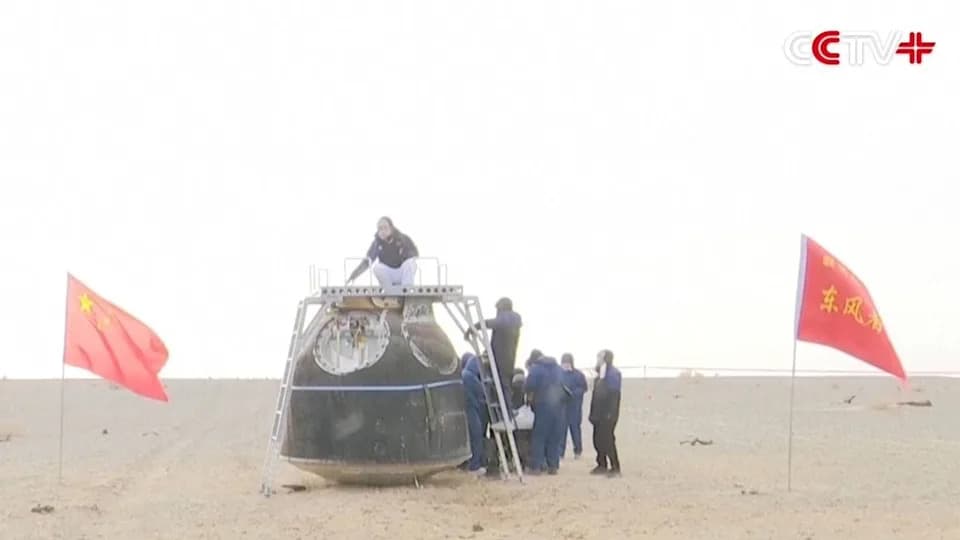Three Shenzhou‑20 astronauts — Wang Jie, Chen Zhongrui and Chen Dong — have been delayed from returning after their return capsule was reportedly hit by small space debris shortly before a planned Nov. 5 departure. CMSA announced the postponement on Weibo and said an impact analysis and risk assessment are ongoing; six taikonauts are currently aboard Tiangong following a handover with Shenzhou‑21. If the Shenzhou‑20 module is judged unsafe it may be jettisoned, with the crew returning in the Shenzhou‑21 return module. The incident highlights growing concerns about orbital debris and follows earlier hits to both Tiangong and the ISS.
Three Chinese Taikonauts Delayed After Suspected Space‑Debris Strike on Return Capsule

Three Chinese taikonauts delayed after suspected space‑debris impact on return capsule
Three Chinese astronauts — Wang Jie, Chen Zhongrui and Chen Dong, the Shenzhou‑20 crew — have been temporarily prevented from returning to Earth after their return capsule was reportedly struck by a small piece of suspected space debris just hours before a planned departure.
The China Manned Space Agency (CMSA) posted a notice on Weibo at about 10:30 a.m. local time saying the return was postponed because the capsule "is suspected of being impacted by small space debris" and that an "impact analysis and risk assessment are underway" to protect crew health and safety. CMSA has not yet released details on the extent of any damage or a revised timeline for the crew's return.
The Shenzhou‑20 vehicle has been docked to China's Tiangong space station since it delivered the crew on April 24. The spacecraft comprises three main sections: a power and propulsion module, a crew living (orbital) module, and a parachute‑assisted reentry (descent) capsule, according to reporting by Ars Technica. If any section is judged unsafe for human return, CMSA may jettison the damaged vehicle and bring the astronauts home in a different return module.
Because Shenzhou‑20 completed a handover with Shenzhou‑21, there are currently six taikonauts aboard Tiangong. If Shenzhou‑20's return module is unusable, CNSA guidelines and Reuters reporting indicate the Shenzhou‑20 crew would likely return in the Shenzhou‑21 return module, which would then be replaced by a standby spacecraft.
Commander Chen Dong has now logged more than 400 cumulative days in space, a Chinese record that will be extended by this delay. For context, Russian cosmonaut Oleg Kononenko holds the record for most nonconsecutive days in space at 1,111 days. The situation is reminiscent of a September 2023 incident in which NASA astronaut Frank Rubio's return was unexpectedly extended to 371 days after a meteoroid struck his crew's return module while docked at the International Space Station (ISS).
Incidents involving orbital debris are not new to Tiangong. In 2023, a piece of debris damaged one of the station's solar panels and caused a partial power outage; extra shielding was later installed during spacewalks. The ISS similarly performs regular avoidance maneuvers to dodge large objects and has sustained damage from smaller micrometeoroids and debris over the years.
Experts warn that the volume of space debris in low Earth orbit is rising quickly as more satellites and missions launch. Continued growth could increase the risk of cascading collisions — a theoretical scenario known as the Kessler Syndrome — which would make certain orbital altitudes hazardous. National space agencies and private companies are testing debris‑mitigation and removal techniques, while investigators assess the Shenzhou‑20 capsule to determine whether the three taikonauts can return safely or must remain aboard longer.
CMSA statement (translated): "The return capsule is suspected of being impacted by small space debris. Impact analysis and risk assessment are underway to ensure the crew's health and safety."
Help us improve.























